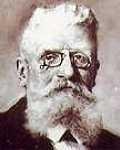The Henkel company was built by Henkel. By rubbing the first detergent that washed the "self" into the market, Henkel set the cornerstone for becoming one of the world's largest chemical companies.
Henkel came to the world in Vöhl / Hessen as the son of a primary school teacher. In the years that he continued to study, the course that attracted most attention to bile was chemistry. When he was 17, he went to Elberfeld, which is considered the emerging industrial region of West Germany. After completing his apprenticeship training at the Sweet Brothers' Paint and Lake Fabric, he was hired as an elementary worker here, and after a short while he was able to rise up to the company's signing authority. With Edith Steinen, he became a quadruped child who married in 1873 (his wife died in 1904).
Henkel resigned in 1874 and became a partner in chemical and paint wholesale at Aachen. Two years later, Potash thought to drive the laundry powder he developed from the mixture of silica and soda to the market. He set up Henkel & Cie's laundry desert factory. The three recruited employees, who were set up in a house in Aachen, immediately began the technique of this "Evrensel-Waschmittels". Henkel is on the market, advertising in newspapers and magazines. The former name, after having a personality according to his own thinking, gave the name "Henkel's Bleach Sode".
Henkel moved to Düsseldorf in 1878 to provide even better traffic. As the work done with Bleach Soda progressed rapidly, Henkel, an enthusiastic entrepreneur, was able to enter new products. In the 1880s, he was involved in the trade of raw materials and chemicals and started to work on tea. First of all, he tried to fight against competing companies of colonial products by advertising and new packaging. "Henkel Thee" offered a sale in a can, not just keeping the aroma, but also using it as another advertising space. Henkel's annual charts exceeded million for the first time in 1899. In the same year, he received a huge factory site in Düsseldorf-Holthausen with an area of 55,000 square meters. Priority was not able to use gloves on this area. In 1905, the old-age insurances provided by the company to employees who exceeded the number of 100, Henkel's samples will provide social benefits.
Sponsored Links
Major Business Areas of Henkel KG
• Organ chemistry (plastics, lacquers, paints)
• Fine chemistry (products for cosmetic and pharmacological chemistry)
• Chemical-technical brand products (adhesives and adhesives)
• Cosmetics, body care products soap, deodorant, cream, perfume, oral hygiene, hair care products)
• Washing / cleaning products (detergent, dishwashing detergent, WC-cleansing products, shoe care products, plant hairdressing products)
In June of 1907, Henkel issued a small advertisement to the journalists, who said, "With the joiner's boiling, effortlessly, white, brilliant laundry without blazing," he wrote a new laundry powder. The most important compounds contained are PERSIL, which is named Perborat and Silicate. Henkel was able to keep the world's first detergent on the market, washing its own clothes. Thus, a daily newspaper in Germany gave a full page advertisement and formed a team of men who walked in crowded streets of big cities in white clothes with white sun parasols. This campaign was very successful.

Within six years, turnover increased by 50 times to 30 million mark. Shortly after the First World War, this laundry was sold in almost all countries with the slogan "Persil bleibt Persil" (Persil, always Persil). Become the largest manufacturer of detergents in Henkel Europe. Henkel, who came to age 78 in 1926, decided to transfer his company capital to his children after his death. Henkel died four years later in Düsseldorf in 1930, several times after the death of his successor Fritz Henkel JR.
This post has received a 2.39 % upvote from @drotto thanks to: @hasancantaskiran.
This post has received a 2.79 % upvote from @morwhale thanks to: @hasancantaskiran.